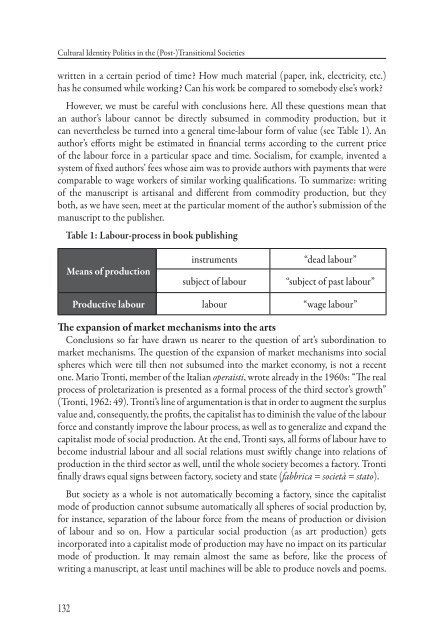Cultural Identity Politics in the (Post-)Transitional Societies
Cultural Identity Politics in the (Post-)Transitional Societies
Cultural Identity Politics in the (Post-)Transitional Societies
Create successful ePaper yourself
Turn your PDF publications into a flip-book with our unique Google optimized e-Paper software.
<strong>Cultural</strong> <strong>Identity</strong> <strong>Politics</strong> <strong>in</strong> <strong>the</strong> (<strong>Post</strong>-)<strong>Transitional</strong> <strong>Societies</strong><br />
written <strong>in</strong> a certa<strong>in</strong> period of time How much material (paper, <strong>in</strong>k, electricity, etc.)<br />
has he consumed while work<strong>in</strong>g Can his work be compared to somebody else’s work<br />
However, we must be careful with conclusions here. All <strong>the</strong>se questions mean that<br />
an author’s labour cannot be directly subsumed <strong>in</strong> commodity production, but it<br />
can never<strong>the</strong>less be turned <strong>in</strong>to a general time-labour form of value (see Table 1). An<br />
author’s efforts might be estimated <strong>in</strong> f<strong>in</strong>ancial terms accord<strong>in</strong>g to <strong>the</strong> current price<br />
of <strong>the</strong> labour force <strong>in</strong> a particular space and time. Socialism, for example, <strong>in</strong>vented a<br />
system of fixed authors’ fees whose aim was to provide authors with payments that were<br />
comparable to wage workers of similar work<strong>in</strong>g qualifications. To summarize: writ<strong>in</strong>g<br />
of <strong>the</strong> manuscript is artisanal and different from commodity production, but <strong>the</strong>y<br />
both, as we have seen, meet at <strong>the</strong> particular moment of <strong>the</strong> author’s submission of <strong>the</strong><br />
manuscript to <strong>the</strong> publisher.<br />
Table 1: Labour-process <strong>in</strong> book publish<strong>in</strong>g<br />
Means of production<br />
<strong>in</strong>struments “dead labour”<br />
subject of labour “subject of past labour”<br />
Productive labour labour “wage labour”<br />
The expansion of market mechanisms <strong>in</strong>to <strong>the</strong> arts<br />
Conclusions so far have drawn us nearer to <strong>the</strong> question of art’s subord<strong>in</strong>ation to<br />
market mechanisms. The question of <strong>the</strong> expansion of market mechanisms <strong>in</strong>to social<br />
spheres which were till <strong>the</strong>n not subsumed <strong>in</strong>to <strong>the</strong> market economy, is not a recent<br />
one. Mario Tronti, member of <strong>the</strong> Italian operaisti, wrote already <strong>in</strong> <strong>the</strong> 1960s: “The real<br />
process of proletarization is presented as a formal process of <strong>the</strong> third sector’s growth”<br />
(Tronti, 1962: 49). Tronti’s l<strong>in</strong>e of argumentation is that <strong>in</strong> order to augment <strong>the</strong> surplus<br />
value and, consequently, <strong>the</strong> profits, <strong>the</strong> capitalist has to dim<strong>in</strong>ish <strong>the</strong> value of <strong>the</strong> labour<br />
force and constantly improve <strong>the</strong> labour process, as well as to generalize and expand <strong>the</strong><br />
capitalist mode of social production. At <strong>the</strong> end, Tronti says, all forms of labour have to<br />
become <strong>in</strong>dustrial labour and all social relations must swiftly change <strong>in</strong>to relations of<br />
production <strong>in</strong> <strong>the</strong> third sector as well, until <strong>the</strong> whole society becomes a factory. Tronti<br />
f<strong>in</strong>ally draws equal signs between factory, society and state (fabbrica = società = stato).<br />
But society as a whole is not automatically becom<strong>in</strong>g a factory, s<strong>in</strong>ce <strong>the</strong> capitalist<br />
mode of production cannot subsume automatically all spheres of social production by,<br />
for <strong>in</strong>stance, separation of <strong>the</strong> labour force from <strong>the</strong> means of production or division<br />
of labour and so on. How a particular social production (as art production) gets<br />
<strong>in</strong>corporated <strong>in</strong>to a capitalist mode of production may have no impact on its particular<br />
mode of production. It may rema<strong>in</strong> almost <strong>the</strong> same as before, like <strong>the</strong> process of<br />
writ<strong>in</strong>g a manuscript, at least until mach<strong>in</strong>es will be able to produce novels and poems.<br />
132




